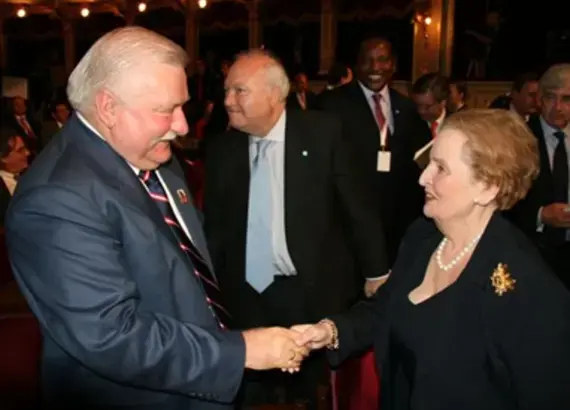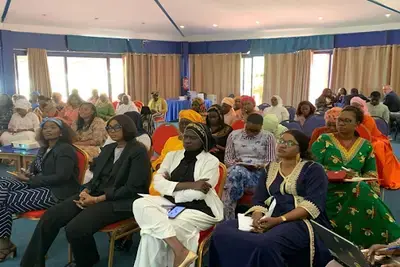
Success Story
Albright Reaffirms Need to Work at Preserving 'Gift of Freedom'
The fragility of freedom and how to preserve it was one of the themes explored at the 10th anniversary meeting of the Community of Democracies (CoD), a global coalition of democratic countries, meeting July 2-4 in Krakow, Poland.
NDI Chairman Madeleine K. Albright, who as U.S. secretary of state was an initiator of the organization along with the late Polish Foreign Minister Bronislaw Geremek, returned to Poland for the gathering. In 2000 in Warsaw, ministerial delegations from 106 countries signed a declaration, "Toward the Community of Democracies," with the aim of demonstrating methods of support to countries striving for democracy and freedom.
The Krakow meeting was attended by 80 official delegations from around the world, including 40 at the ministerial level, as well as 200 civil society activists from Burma, Zimbabwe, China, Russia and Cuba, among other places. Also attending were parliamentarians from Europe, Africa and North America who are participants in the community's Parliamentary Forum, which was launched last March at the initiative of Lithuania, which currently holds the CoD chairmanship.
New Technologies Create Opportunities, Risks in Democracy Support

In the decade since the founding of the Community of Democracies, a major change has been the explosion of technology and the tools it has created, both for those supporting the free flow of ideas and other democratic values and for authoritarian states interested in the opposite, curtailing information and suppressing human rights. Speaking on a panel in Krakow, NDI's chief technology officer, Chris Spence, explored the role of technology in democratic development and the risks its use poses in closed societies.
"Our view is that technologies are clearly a net positive for democracy...because of the important role [they] can play in consolidating democracy in fragile and transitional democratic states," he said.
The Krakow meeting focused on challenges to democracy and, specifically, how to overcome obstacles in the path of building civil society in the contemporary world. The CoD is developing a global democracy work plan focusing on such areas as civil society protections; gender equality and women's rights; poverty, development and democracy; promoting democracy and responding to national and transnational threats; and regional cooperation.
Albright attributed the success of the first gathering in 2000 to Geremek, who died in 2008 and for whom a democracy award has now been named. "In his welcoming remarks," she said, "he declared that 'the emergence of democracy was the most important development of the 20th century.' But he also reminded us that the gift of freedom was never fully safe – because from one direction or another, the principles of freedom will always be opposed. He argued, therefore, that those who are blessed to live in a democracy have an obligation to repay that blessing by upholding free institutions and by teaching, protecting, and cherishing democratic values."
Albright presented the Geremek Award to Father José Conrado Rodriguez of Cuba, a minister in the impoverished city of Santiago de Cuba. Father José, she said, "reminds us that democracy – at its best – is more than just another system of government... Democracy is grounded in a belief that the legitimate power of governance comes not from the barrel of a gun, or from the means to arrest and to brutalize prisoners, or from the capacity to punish those who dare to voice their discontent. Power, to be legitimate, must come from the people."
U.S. Secretary of State Hillary Clinton, who delivered a keynote address, noted "three essential elements of a free nation – representative government, a well-functioning market and civil society – that work like three legs of a stool." But "walls are closing in" on civic organizations in an increasing number of countries, she said, citing Zimbabwe, the Democratic Republic of Congo, Ethiopia, Venezuela, Russia, China and Egypt. "Over the last six years, 50 governments have issued new restrictions against NGOs, and the list of countries where civil society faces resistance is growing longer."
"An attack on civic activism and civil society is an attack on democracy," she said. "...it doesn't matter whether the goal is better laws or lower crime or cleaner air or social justice or consumer protection or entrepreneurship and innovation, societies move forward when the citizens that make up these groups are empowered to transform common interests into common actions that serve the common good."
The next ministerial level meeting will take place in 2011 in Vilnius, Lithuania.
Related:
Pictured above: Lech Walesa and Madeleine Albright greet each other at the 10th anniversary meeting of the Community of Democracies. Photo courtesy of Pavol Demes.
Published on July 16, 2010



